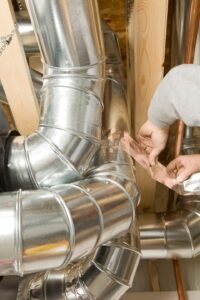Let’s put it bluntly: your heater is a forced-air heating system, so without proper airflow, what are we left with? A big hot box that only heats the room it’s in. That’s not useful.
Everyone gets stuck plugging in a query to Google like “heating repair near me” when their heater goes out. Do yourself a favor: fix airflow problems now, and you should be able to avoid a full breakdown.
Let’s talk about just how important airflow is for your heater and why it matters.
A Lack of Airflow Leads to Higher Bills
One of the biggest problems is that bad airflow just costs you more money, plain and simple. Because your heater needs a certain amount of air to operate, clogs and disruptions to that airflow cause it to run for longer.
The longer it runs to achieve your desired house temperature, the more energy it uses. On top of that, it means your heater runs for longer and endures more wear and tear. Bad airflow effectively forces your heater to beat itself up more than it needs to just to get the job done.
Potentially Hazardous Furnace Damage
If you’re heating your home with a combustion-based furnace, you have the potential hazard of carbon monoxide leaks from your heat exchanger. This isn’t usually something you need to think about, but if your unit can’t force hot air into the vents, the heat exchanger can overheat.
An overheated exchanger can be more prone to cracks and damage that result in carbon monoxide leaks. These cracks are nearly impossible for anyone other than experienced technicians to spot and diagnose.
The heater is still going to heat up when you turn it on, but if you can’t force that hot air through the vents, it sits and damages the unit.
Airflow Output Can Cause Mold Damage to Your Home
Your ductwork is part of the airflow system in your heater. When your heater successfully pulls in air, it pushes hot air and that travels to the vents throughout your home.
Heat and humidity go hand-in-hand. If you have leaky ducts or vent covers, that heat leaks into small dark crevices in your home and provides the perfect habitat for mold growth.
Mold can not only severely damage your home over time, but it also introduces health risks. Mold spores are extremely harmful and can cause “sick building syndrome” and a slew of other health problems.
Sealed ducts are part of the airflow process. Leaky ducts also lead to higher heating bills because the air isn’t being pushed into your home where your thermostat can read it. It’s a full-circle kind of issue.
Your Heater Needs to Breathe
With proper airflow, your heater can do its job with peak efficiency. You’ll enjoy lower bills, better air quality, and your heater won’t endure as much wear and tear. Simply put, it’s better to switch out filters and maintain good airflow now rather than pay for it later with large-scale repairs.
Contact us today to fix problems with airflow for your heater or HVAC system as soon as possible.


